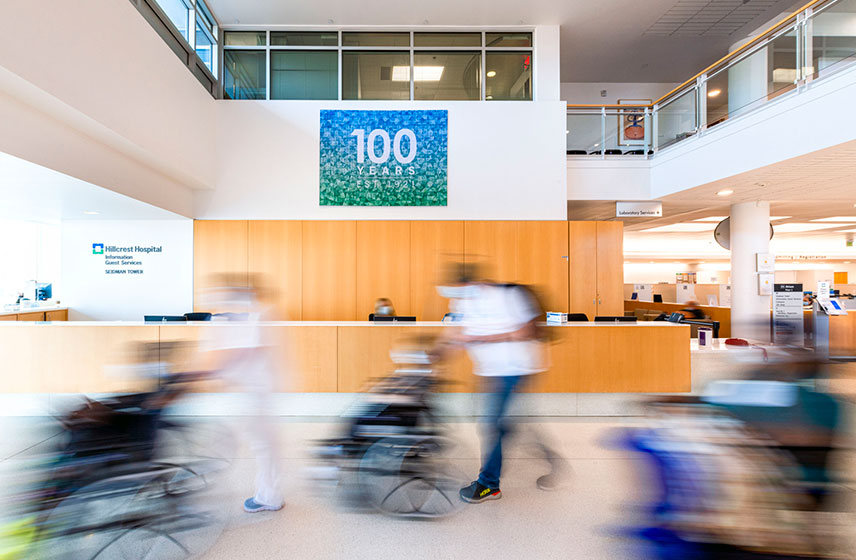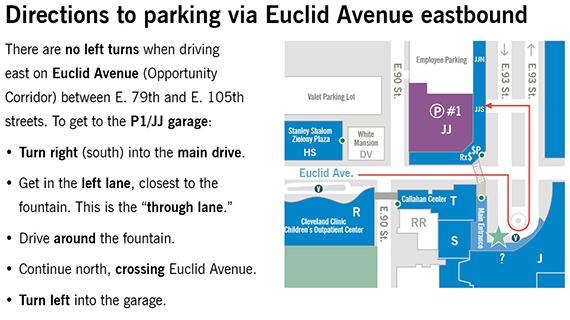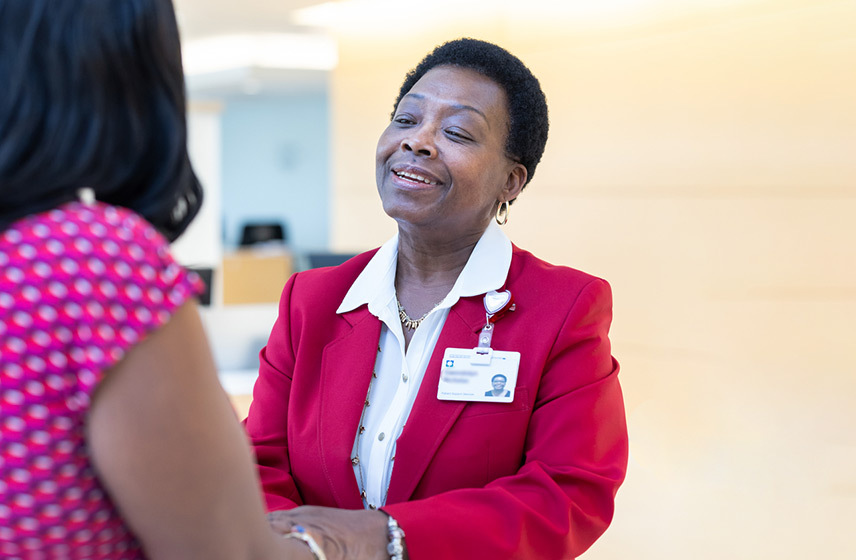
Accessibility
And as you’re heading to the doctor or into the hospital, you’ve probably already got a dozen questions running through your mind. Where do I park? What building was that? What floor do I need to get to? Are the bathrooms accessible?
We get that. Each of us has our own needs, differing abilities and personal challenges. And that makes it our job to give you the right information so you can get the care you need. At Cleveland Clinic, accessibility for all is always our goal.
Now, let’s get you where you need to go.
Getting to Cleveland Clinic
Here’s how to get started:
- Visit our main Travel page.
- Visit our Travel Assistance page.
- Visit Cleveland Clinic Florida.
- Visit Cleveland Clinic Canada.
- Visit Cleveland Clinic London.
- Visit Cleveland Clinic Nevada.
- Visit Cleveland Clinic Abu Dhabi.
- Visit another Cleveland Clinic location.
Accessible Parking
You can find accessible parking at every Cleveland Clinic location. Check out a map of our parking locations at our main campus to learn more before your visit.
Main campus self-parking
- Accessible lot: A surface parking lot at E. 100th St. and Carnegie Avenue (located next to the Crile Building) has 27 spaces reserved for accessible parking only. This lot fills up quickly each day, so it’s helpful to be aware of other parking options.

The 93rd St. entrance to our P1 Parking Garage is easily reached from Chester Avenue from both directions (east or west) — but on Euclid Avenue, only westbound traffic has direct and easy access. Eastbound traffic can still get to the garage but must first turn right into the traffic circle in front of Miller Family Pavilion and then re-cross Euclid to 93rd or go around the block and enter from Chester Avenue.
- P1 Parking Garage: The entrance to our main (P1) parking garage is on E. 93rd St. between Euclid Avenue and Chester Avenue. This main garage has spaces reserved for accessible parking on all floors and an accessible bathroom on the third floor. Access to the hospital is through a tunnel at Level B.
- P2 Parking Garage: Our second largest (P2) parking garage at E. 100th St. and Carnegie Avenue has accessible reserved spaces on all floors, but no bathroom facilities. The third floor of this garage connects to an accessible skyway which is connected to most major main campus buildings. We also provide a golf-cart shuttle from the P2 garage to three high-use buildings: Taussig Cancer Center (CA Building), the Crile Building (A Building) and Glickman Tower (Q Building).
NOTE: East 100th Street is closed between the P2 garage and Cedar Avenue to the south due to a long-term construction project. Here are a few ways you can still get to the P2 garage during the closure:
- If you’re coming from the west, turn right onto E. 100th.
- If you’re coming from the east, turn left onto E. 100th.
- If you’re coming from the south on E. 105th Street, turn left onto Carnegie Avenue then left onto E. 100th.
- If you’re coming from the north on E. 105th Street, turn right onto Carnegie Avenue then left onto E. 100th.
Surface lot parking at Mellen Center for Multiple Sclerosis (U Building)
If you or your loved one has MS or another neurologic condition, this surface parking lot is directly in front of the U Building - Mellen Center and easily reached from E. 89th Street.
Valet parking at main campus, other locations
If you or your ride pulls up to our main campus entrance and many other sites, you may be able to have a valet park your vehicle. This way, you can accompany your loved one to their appointment, instead of dropping them off while you go to park your vehicle and then hurrying back.
Valet parking costs $10 for accessible and senior parking — the same price as self-parking.
Valet parking is available 24/7 every day of the year at the main entrance to our main campus, and 6 a.m. to 6 p.m. at other main campus locations.
This service is also available at many of our hospitals and Family Health Centers. You can use valet parking at the following sites:
Main campus
- Children’s Outpatient Center (R Building).
- Sydell and Arnold Miller Family Pavilion (J Building).
- Crile (A Building).
- Cole Eye Institute (I Building).
- Taussig Cancer Center (CA Building).
Hospitals
- Akron General, main entrance.
- Akron General, Heart and Vascular Center entrance.
- Euclid Hospital.
- Fairview Hospital main entrance.
- Fairview Hospital, emergency department.
- Hillcrest Hospital.
- Lutheran Hospital.
- Mentor Hospital.
- Mercy Hospital.
- South Pointe Hospital.
Family health centers
- Beachwood Family Health and Surgery Center.
- Richard E. Jacobs Health Center.
- Strongsville Family Health & Surgery Center.
- Twinsburg Family Health & Surgery Center.
Medical office buildings
Shuttles at main campus
At our main campus, we have free wheelchair-capable, on-demand and curbside shuttle services 365 days a year. The shuttles run from 4:45 a.m. to 10 p.m. on weekdays and from 6:30 a.m. to 10 p.m. on weekends.
You can request shuttle service by calling ahead or even by flagging down shuttles traveling to certain sites:
- To request a shuttle, call 216.444.8484 (or 48484 from an internal phone) and select option 1. A shuttle will pick you up to take you to the entrance of any Cleveland Clinic-affiliated building on our main campus, or to any of three affiliated hotels — The InterContinental Hotel Cleveland, The InterContinental Suites Hotel or Holiday Inn Cleveland Clinic.
- You may flag down one of the shuttles which travels a regular loop each day, connecting the three hotels (mentioned above) to the Crile Building (A Building) and Glickman Tower (Q Building).
When You Arrive at Our Door
Every time you come through our doors, we promise to treat you and your loved ones as a part of our larger family. It’s our goal to provide you with the best possible experience while you’re with us. Here are some of the other ways we try to do that.
Red Coats

It’s always nice when you get somewhere and there’s someone to greet you and point you in the proper direction. That’s one of the things that our Red Coats can do for you when you arrive at our main campus or several of our regional hospitals. Red Coats — a group unique to the Cleveland Clinic — are easily identified by their red blazers.
The Red Coats are trained to help if you’re hard of hearing or deaf, have low vision or blindness, have limited mobility or have other access needs. They can also contact an interpreter if English isn’t your preferred language or if you use American Sign Language.
In Ohio, you’ll find Red Coats at our main campus in Cleveland, our Hillcrest Hospital campus in Mayfield Heights and Mercy Hospital in Akron. Several Florida locations, including Weston Hospital and Indian River Hospital, also have Red Coats.
If a Red Coat caregiver can’t help directly, they’ll find someone who can. And if you’re at one of our medical office buildings or other locations not staffed by Red Coats, ask any of us at Cleveland Clinic and we’ll do our best to lend a hand.
Wheelchairs
You can get a wheelchair on all Cleveland Clinic campuses at no cost. To use one, simply ask any Cleveland Clinic caregiver for assistance.
Accessible restrooms
Wheelchair-accessible restrooms are widely available to the public, as we comply with Americans with Disabilities Act (ADA) guidelines. If you have trouble finding one, ask one of our caregivers.
Food service
All our food service areas and cafeterias at our main campus in Cleveland, Ohio, have wheelchair-accessible tables and counters for food service and ADA-compliant, wide doorways.
Several other hospitals have wide entrances, open floor plans for easy maneuverability and open-faced coolers and beverage coolers for access within an arm’s reach, including:
- Avon Hospital.
- Akron Hospital.
- Fairview Hospital.
- Lutheran Hospital.
- Medina Hospital.
- Union Hospital.
Other accessibility food service features include:
- Euclid Hospital has elevator access to the café in the basement of the hospital.
- Marymount Hospital has a ramp that provides wheelchair access to its café. Many food options are accessible by wheelchair, including grab-and-go food and beverages, an Italian food station and an entrée station.
- Hillcrest Hospital’s cafeteria is accessible by elevator to the basement of the hospital.
- South Pointe’s cafeteria is easily accessible and on the same floor as the hospital’s main entrance.
Communication Needs
Communication is an important part of caring and our aim is to help you find what you need and where you need to go. We try to do that in many ways. Here are a few:
Language access services
We’re all committed to speaking the language of caring at Cleveland Clinic, but we know that not everyone speaks the same language. Here are the services we provide:
- American Sign Language (ASL): If you or your companion use ASL or interpreting services, Cleveland Clinic will do its best to get an on-site interpreter for scheduled appointments. If, for any reason, an on-site interpreter isn’t available and services can’t be delayed or rescheduled, we’ll provide video remote interpreting (VRI) services via our vendor, CyraCom®. Cleveland Clinic ASL interpreters will be available virtually through FaceTime® or Microsoft Teams®.
- Non-English speakers: We provide free, in-person interpretation for non-English speakers. Languages that can be interpreted may depend on what languages are spoken by interpreters available on that day. That availability may depend on whether they’re helping with a procedure or surgery or assisting another patient. We also offer over-the-phone interpretation, remote video interpreting services like FaceTime or Microsoft Teams, 24/7 for more than 200 languages. Call 216.445.8900 for phone interpretation services.
Hearing needs
It’s important to us that everyone can hear — and understand — their healthcare providers. Please let our caregivers know if you have difficulty hearing and we’ll be sure to update your records. Some other tips:
- Clear masks are available in some areas to make it easier to lipread.
- You’re welcome to use voice-to-text apps like Google Live Transcribe for real-time captioning.
- If you have hearing aids or cochlear implants, let us know how to change the batteries or help make sure you have them on when you’re staying in our hospitals.
- Need help getting hearing aid batteries? You can reach out to any of our audiology locations.
- If you'd like to hear better, we’re here to help. You can schedule an appointment to have your hearing tested and learn about opportunities to improve your hearing by calling 216.444.8500.
Service animals
Service animals are welcome at Cleveland Clinic. We understand that service animals aren’t pets and that they serve a valuable function for their human partners.
After Your Visit
We’re trying our best at Cleveland Clinic, but we can always improve. So let us know how we did — what we did well and what we can do better to improve the accessible experience for you and your loved ones.
General feedback
We always hope to meet — or exceed — your expectations every time you visit us. If you’d like to provide us with feedback about what didn’t work for you, please reach out at ombudsman@ccf.org.
Or give us a call at 216.444.2544 or toll-free 800.223.2273, ext. 42544 between 8 a.m. and 5 p.m., Monday-Friday.
ASL interpreter feedback
If you’ve received ASL interpreter services at Cleveland Clinic, you can share feedback on your experience by completing this interpreter evaluation form.